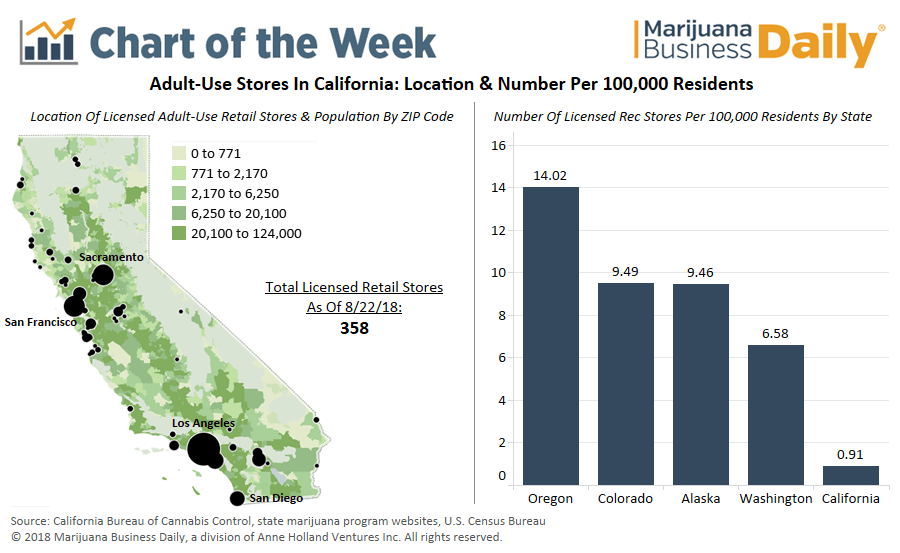(This story has been updated from an earlier version with the start date for adult-use sales in Long Beach, California.)
The number of licensed recreational cannabis stores in California is far short of what’s needed to adequately supply the market, as licensing logjams at the local level constrain establishment of operations in large portions of the state.
It’s yet another issue hampering the rollout of California’s recreational marijuana industry, which has experienced lower-than-expected tax revenue and a flourishing black market.
Some numbers swirling around the situation include:
- According to data from the California Bureau of Cannabis Control, the state currently has 358 licensed recreational marijuana stores. That’s less than one store per 100,000 residents – about 15 times less than the number of adult-use stores in Oregon on a per capita basis.
- In some major population centers throughout the state – such as Fresno and Bakersfield, which have a combined population of more than 900,000 – the nearest recreational store is more than an hour’s drive away.
- Along Interstate 5 between San Francisco and Los Angeles – a major stretch of highway spanning more than 350 miles – adult-use shops are nearly nonexistent.
The issue stems from California’s dual-licensing system between state and local governments, which requires cannabis businesses to obtain local authorization from the city and/or the county in which they’ll operate before they can apply for a state license.
But only 70 of the state’s 482 cities allow adult-use retail stores, according to a database created by The Cannifornian, a news outlet covering the California marijuana industry.
Though it’s still very early for California’s recreational marijuana industry, and more towns and municipalities will likely eventually allow adult-use stores, the state has not kept pace with other markets on the number of licensed rec shops early on.
Colorado, for example, had 242 licensed recreational marijuana stores nine months after the launch of its adult-use industry – about 4.3 per 100,000 residents, nearly five times California’s current count on a per capita basis.
Additional findings from the state licensing data include:
- Combined, Los Angeles, San Francisco and Sacramento account for about 14% of California’s total population but are home to more than half of all adult-use stores in the state. Overall, roughly 30% of the state’s residents live in a city or town with a licensed recreational marijuana store.
- To reach the same number of licensed adult-use stores on a per capita basis as Colorado, California would need more than 3,700 retail locations – or more than 10 times the amount currently licensed. To match Oregon, California would require more than 5,500 recreational retail shops.
- Four of the top 10 most-populous cities in California – Fresno, Long Beach, Bakersfield and Anaheim, which have a combined population of 1.7 million – do not have any retail marijuana stores. Long Beach, however, is slated to begin recreational sales Sept. 1.
Eli McVey can be reached at elim@mjbizdaily.com





